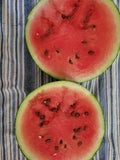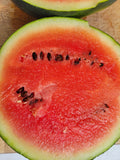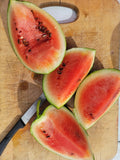Quick Facts:
- Excellent short-season watermelon
- Dark pink flesh
- Sweet and juicy
- Requires less fertility than other watermelon varieties, great for organic gardens
Citrullus lanatus
65-75 days. What a little gem born right here in the gem state! Bred in Northern Idaho where the nights are cold, the days are hot, and the seasons are short, this watermelon is great for short season climates or for early season production. Tolerant of both heat and cold, this watermelon is widely adaptable and would grow well in hot humid climates as well. Sweet, crisp, and juicy. Very productive, with the average melon 8 inches across and 8-12lbs. Keeps well off the plant for 2-3 weeks.
A bit of its story:
Thanks to Carol Deppe's book, Breed Your Own Vegetable Varieties, we know a lot about the breeding process of Glenn Drown's 'Blacktail Mountain Watermelon'. Glenn wanted a short season watermelon with great flavor, so he crossed two watermelon varieties using traditional plant breeding techniques used by farmers and gardeners for centuries. He selected the melons that matured the earliest and saved the seeds from those for four years. After four years, he had the stable variety we know and love as 'Blacktail Mountain' watermelon! Glenn was an amateur plant breeder and he bred one of the most popular watermelon varieties for short season climates- super inspiring. Will you be next?? To learn more about the breeding process, check out Carol's book: Breed Your Own Vegetable Varieties.
How to Grow it:
|
Germ Temp |
Indoor Start |
Germ Days |
Frost Tolerant |
Sun |
Seed Depth |
Plant/Row Spacing |
|
70 |
4 weeks |
3-10 d. |
No |
Full |
1/2 inch |
48"/24" |
Watermelon seeds will not germinate at temperatures below 65 degrees. Start inside 4 weeks before last frost, but not sooner as larger plants don't transplant well. Alternatively, direct sow outside after all danger of frost has passed. Give them room to grow, with about 36" between plants on all sides. Watermelons are ripe when the underside of the skin is no longer yellow (this is called the "ground spot"), when they sound slightly hollow when thumped, and when the tendril that joins the main stem of the fruit to the vine is brown and dry.
If you do breed the next amazing plant variety, make sure its pledged open source so that all of humanity- not just a few corporate interests- can benefit from the common heritage that is resilient plant genetics! Glenn Drowns made sure this is an Open Source Seed Initiative pledged variety.
|
Seed specs: 2 g, ~30 seeds
|






